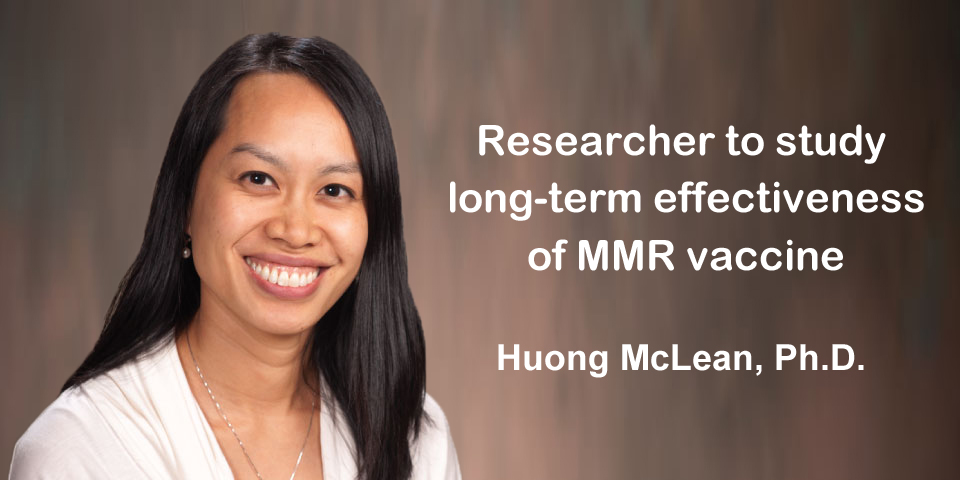Researchers will evaluate immune response of a three-dose schedule in young adults
A $440,000 federal grant will support Marshfield Clinic researchers’ study of long-term effectiveness of a third dose of Measles, Mumps and Rubella (MMR) vaccine, as scientists work to better protect against mumps.
Researchers will work to determine the long-term immune response to a third dose. This is important, given recent mumps outbreaks among highly vaccinated populations in the United States.
“Two doses of MMR vaccine works well in protecting most people from contracting mumps, but does not seem to work as well in certain close-contact settings,” said Huong McLean, a research scientist at the Center for Clinical Epidemiology and Population Health, Marshfield Clinic Research Foundation (MCRF), and lead investigator of this study. “Following these outbreaks, we began to ask, ‘Can a third dose prevent or stop a mumps outbreak and how long would the protection last?’”
This study will continue a study started in 2009-10 in which MCRF enrolled young adults ages 18-24 in a CDC-funded study looking at safety and short-term immune response to a third dose of MMR vaccine. Researchers now will reach out to those same study enrollees to see if their immune response has changed five years later.
In 2006, there was a multi-state mumps outbreak with more than 6,500 reported cases. In 2009-10, another large mumps outbreak occurred in multiple locations in northeastern U.S. with about 3,000 reported cases. This year, mumps outbreaks have been reported in at least four U.S. universities, including the University of Wisconsin-Madison. Most people diagnosed with mumps in these outbreaks had received two previous doses of MMR vaccine.
As a result, the Centers for Disease Control and Prevention (CDC) is interested in studying the long-term response to a third dose to help inform policy should future outbreaks occur.
Marshfield Clinic has a long history of studying MMR vaccine safety and immune response. It participated in a 1990s study that looked at effectiveness and assessed adverse effects of a second dose of MMR vaccine given to students in kindergarten and middle school.
“We continue to study the safety and effectiveness of all vaccines to help inform policy. This is no different,” McLean said. “The currently available data is not enough to make any recommendation for or against a third dose of the MMR vaccine in certain situations or populations for mumps control. This study will help guide policy makers in making that decision.”
Most participants enrolled in the first phase of the MMR3 study will qualify for this study as well. For more details, call 715-221-6715 or email mmr3study@marshfieldclinic.org.



